Mists of Everness is John C. Wright's sequel to his novel Last Guardian of Everness , published in 2005, continuing the harrowing adventures of Raven, Wendy, Lemuel, Peter, and Galen. We learn here that to save the world from the evil tyrant Morningstar (Satan, Lucifer), they must hand it over to the "good" tyrant Oberon. Mists of Everness gets its title from the mists that fog people's minds, making the magic world/dream world invisible and incorporeal to mortals.
This latest installment in the Chronicles of Everness includes new mythologies: that of the oldtime radio program, "The Shadow," and the three dark gods: Fate, Death, and War.
As in the previous novel, Wright blends classical, Norse, Judeo-Christian, Celtic, Hindu, Persian, and other mythologies into a riveting, though complicated, whole.
Likewise, as in the first novel, Wright contrasts European/Old World mythos with the American ideals of democracy, liberty, and justice. Also, while the books contain mythologies/legendary from around the world (including reference to Hindu beliefs, medieval Muslim knights, and Asian warriors), these books are first and foremost about dreams:
Basically, the world of dreams, aka "magic, myth, and monsters," is a world where the old gods of Europe, Asia, and Africa live on and coexist with the ideas/dreams/stories of J.R.R. Tolkien (with references to Tirion and Vinyamar, called Vindyamar in the book), H. P. Lovecraft, and E.R. Eddison, among others. The theme of the book is that dreams, although powerful and necessary for human sanity, are dangerous if brought into the real world.
What sets Mists of Everness apart from the first book is the depth to which the author goes in describing oneirotech: "Dream-science." With a little dream-power and the aid of the Silver Key, mortals are able to make dreams into matter. The psychology of dreams and the unconscious mind also play a deeper role. For example, one character explains how certain symbols/objects have more power in the dream realm because they are deeply ingrained in the collective unconscious (called "racial subconscious" in the book). Swords work better than guns because a sword has mythic properties about it, connotations that reach back into the psyche of every dreaming human. In other words, swords have a deeper psychological meaning for humans than guns, horses more than cars, etc.
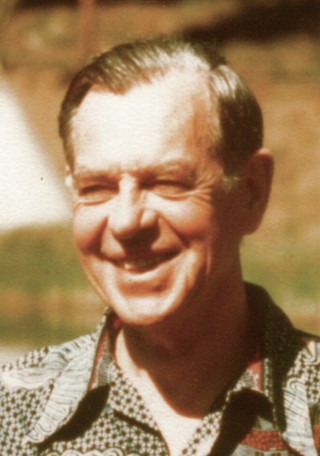
Joseph John Campbell was an American writer. He was a professor of literature at Sarah Lawrence College who worked in comparative mythology and comparative religion. His work covers many aspects of the human experience. Campbell's best-known work is his book The Hero with a Thousand Faces (1949), in which he discusses his theory of the journey of the archetypal hero shared by world mythologies, termed the monomyth.
Maya, literally "illusion" or "magic", has multiple meanings in Indian philosophies depending on the context. In later Vedic texts, māyā connotes a "magic show, an illusion where things appear to be present but are not what they seem"; the principle which shows "attributeless Absolute" as having "attributes". Māyā also connotes that which "is constantly changing and thus is spiritually unreal", and therefore "conceals the true character of spiritual reality".
Collective unconscious refers to the unconscious mind and shared mental concepts. It is generally associated with idealism and was coined by Carl Jung. According to Jung, the human collective unconscious is populated by instincts, as well as by archetypes: ancient primal symbols such as The Great Mother, the Wise Old Man, the Shadow, the Tower, Water, and the Tree of Life. Jung considered the collective unconscious to underpin and surround the unconscious mind, distinguishing it from the personal unconscious of Freudian psychoanalysis. He believed that the concept of the collective unconscious helps to explain why similar themes occur in mythologies around the world. He argued that the collective unconscious had a profound influence on the lives of individuals, who lived out its symbols and clothed them in meaning through their experiences. The psychotherapeutic practice of analytical psychology revolves around examining the patient's relationship to the collective unconscious.
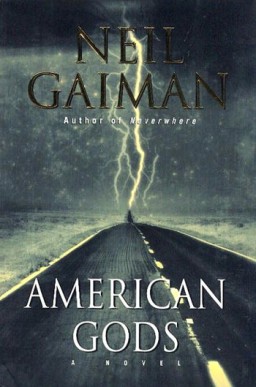
American Gods (2001) is a novel by British author Neil Gaiman. The novel is a blend of Americana, fantasy, and various strands of ancient and modern mythology, all centering on the mysterious and taciturn Shadow.
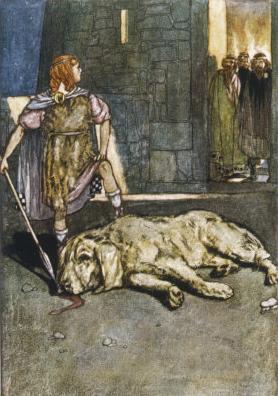
A demigod is a part-human and part-divine offspring of a deity and a human, or a human or non-human creature that is accorded divine status after death, or someone who has attained the "divine spark". An immortal demigod often has tutelary status and a religious cult following, while a mortal demigod is one who has fallen or died, but is popular as a legendary hero in various polytheistic religions. Figuratively, it is used to describe a person whose talents or abilities are so superlative that they appear to approach being divine.

Changeling: The Dreaming is a tabletop role-playing game originally published by White Wolf Publishing in July 1995, and is part of the World of Darkness series. Player characters are changelings, fae souls reborn into human bodies, a practice begun by the fae to protect themselves as magic vanished from the world. White Wolf Publishing released a second edition in 1997, and Onyx Path Publishing released a 20th Anniversary Edition in 2017.
Mystra is a fictional goddess in the Forgotten Realms campaign setting for the Dungeons & Dragons fantasy role-playing game.
Mythopoeia, or mythopoesis, is a narrative genre in modern literature and film where an artificial or fictionalized mythology is created by the writer of prose, poetry, or other literary forms. The concept, which long preexisted him, was widely popularised by J. R. R. Tolkien in the 1930s. The authors in this genre integrate traditional mythological themes and archetypes into fiction. Mythopoeia is also the act of creating a mythology.

The Presence is a fictional character in comic books published by DC Comics. The character debuted in More Fun Comics #52, and was created by Jerry Siegel and Bernard Baily.
The Book of Swords Series is a series of science fiction/fantasy novels written by Fred Saberhagen from 1983 to 1995. The story revolves around the Twelve Swords of Power, which were forged by the gods and given to humanity, and how various characters acquire and use them. The series spans several decades and features dozens of characters.
The Norse mythology, preserved ancient Icelandic texts such as the Poetic Edda, the Prose Edda, and other lays and sagas, was little known outside Scandinavia until the 19th century. With the widespread publication of Norse myths and legends at this time, references to the Norse gods and heroes spread into European literary culture, especially in Scandinavia, Germany, and Britain. In the later 20th century, references to Norse mythology became common in science fiction and fantasy literature, role-playing games, and eventually other cultural products such as Japanese animation. Storytelling was an important aspect of Norse mythology and centuries later, with the rediscovery of the myth, Norse mythology once again relies on the impacts of storytelling to spread its agenda.
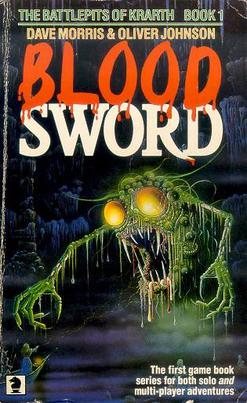
Blood Sword is a series of gamebooks created by Oliver Johnson and Dave Morris and published by Knight Books in the late 1980s. The books were illustrated by Russ Nicholson and the maps supplied by Geoff Wingate. It was set in the authors' own fantasy world of "Legend" which was also the setting for their Dragon Warriors role playing game.

Monster Mythology, published by TSR in 1992, is a sourcebook about non-human deities that can be used in fantasy role-playing games using the second edition rules for Advanced Dungeons & Dragons (AD&D).

The Hunter's Moon is a fantasy novel by O.R. Melling about two teenage cousins, one Irish, the other Canadian, that set out to find a magic doorway to the Faraway Country, where humans must bow to the little people. It was published in 1993 by Amulet Books and is the first book in the Chronicles of Faerie, with the second being The Summer King, the third being The Light-Bearer's Daughter, and the fourth and final being The Book of Dreams. It was awarded the Ruth Schwartz Children's Book Award in 1994.

According to the most recent census in 2007, most people have a Christian background, with a sizable Hindu (27.9%) and Muslim (6.3%) minority. Religion tends to split along ethnic lines with most Indigenous Fijians being Christian and most Indo-Fijians being mostly Hindu or in some cases, Muslim.
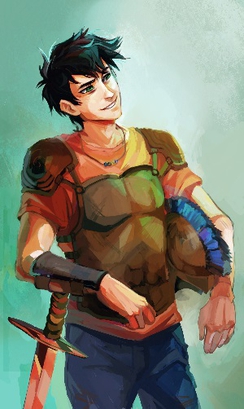
Perseus "Percy" Jackson is a fictional character, the title character and narrator of Rick Riordan's Percy Jackson & the Olympians series. He is also one of seven main protagonists of the sequel series The Heroes of Olympus, appearing in every book except The Lost Hero, and appears in the Trials of Apollo series, making him one of the few characters to appear in all three series of the Camp Half-Blood chronicles. He has also been a narrator and protagonist in Riordan's Greco-Roman/Egyptian crossover stories, part of the Demigods and Magicians collection. The character serves as the narrator in Percy Jackson's Greek Gods and Percy Jackson's Greek Heroes, also by Rick Riordan.
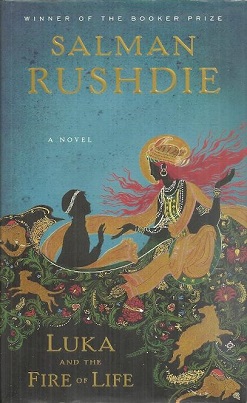
Luka and the Fire of Life is a novel by Salman Rushdie. It was published by Jonathan Cape (UK) and Random House (US) in 2010. It is the sequel to Haroun and the Sea of Stories. Rushdie has said "he turned to the world of video games for inspiration" and that "he wrote the book for his 13-year-old son".
Theros is a set of three expansions to the Magic: The Gathering game, consisting of the sets Theros, Born of the Gods and Journey into Nyx. The setting was later used for a Dungeons & Dragons sourcebook, Mythic Odysseys of Theros (2020). The lore and aesthetics of the game setting was based on Greek mythology.
Xianxia is a genre of Chinese fantasy heavily inspired by Chinese mythology and influenced by philosophies of Taoism, Chan Buddhism, Chinese martial arts, traditional Chinese medicine, Chinese folk religion, Chinese alchemy, other traditional elements of Chinese culture, and the wuxia genre.











